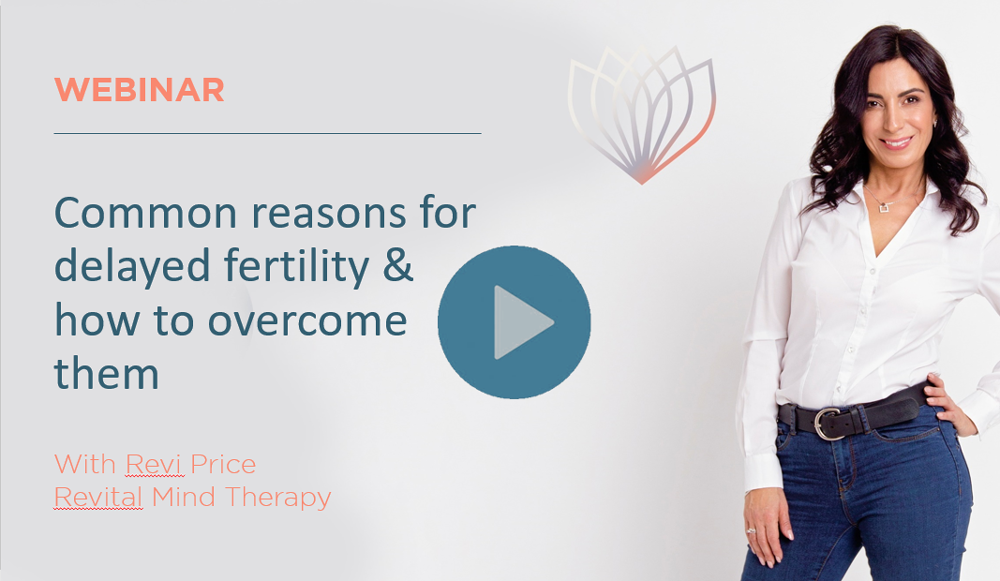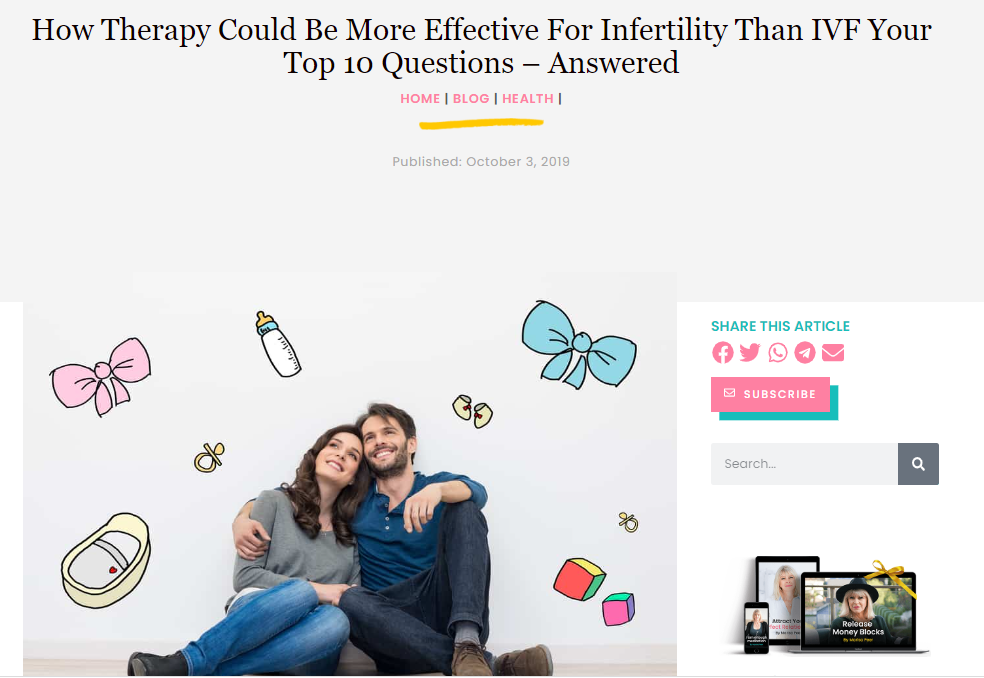Read the founder of RTT, Marisa Peer's article on 20+ years of experience treating delayed fertility with RTT
TRYING TO GET PREGNANT & SUCCEEDING
"There is never a better time than now"

Let me help you...
Read Vicky's story
When I first spoke to Revi I was still grieving following a third failed round of IVF. My husband and I had been trying to conceive for a few years at this point and I seemed to have problems both getting and staying pregnant. We'd tried all sorts. Diet, vitamin supplements, acupuncture, medical intervention...My diagnosis of 'unexplained' infertility meant there was no obvious reason why I shouldn't be able to have a baby yet nothing seemed to work. We'd been unlucky at every opportunity.
You are not alone
Maybe your journey to date has been long. Maybe you've encountered many hurdles along the way. Maybe you've been told medically there is no obvious reason for you not conceiving. Whatever your story, you are probably here because the idea of falling pregnant now seems an impossibility.
Fertility can be a complex and emotional journey for many couples. While some couples are able to conceive relatively easily, others may experience delayed fertility, which can be a source of stress and anxiety. While there are many physical factors that can impact fertility, emotional factors can also play a role in delaying conception.
you are in the right place!

What causes delayed fertility?
There is a connection between emotional factors and delayed fertility. Studies have shown that stress and anxiety can have a significant impact on the body, including the reproductive system. Chronic stress can disrupt hormones and affect ovulation and sperm production, making it more difficult to conceive. Additionally, stress and anxiety can also impact the immune system, which can impact fertility by causing inflammation and increasing the risk of certain health conditions that can impact fertility, such as polycystic ovary syndrome (PCOS) and endometriosis.
In some cases, emotional fears and stress related to infertility can create a cycle of negative thoughts and emotions that can further impact fertility. Women who experience infertility may feel a sense of loss, grief, and anxiety, and these feelings can make it more difficult to conceive.
Common factors include:
Difficulty getting pregnant - Many women with fertility issues may have diffculty conceiving or may experience infertility.
Emotional distress - Fertility issues can take a toll on women''s emotinal well-being, lading to feelings of sadness, anxiety, and depression.
Lack of information and support - Some women may feel alone and unsupported as they navigate the process of trying to conceive.
Financial burden - Fertility treatments can be costly and may not be covered by insurance, making i diffcult for some women to afford the care they need.
Difficulty with relationships - Fertility issues can put a strain on relationships, leading to conflicts and feelings of isolation.
Societal pressure, guilt and shame - Societal pressure and stereotrypes about women's fertility and motherhood can make it difficult for women to talk openly about their fertility issues and seek help.
all is not lost
Your journey to success starts here...
I know you can achieve this dream goal because I have helped many women like you achieve success.
I'm Revi, and I want to help you
My name is Revi Price, and I am a trained RTT practioner. Rapid Transformational Therapy (RTT) is a therapeutic approach that combines elements of hypnotherapy, cognitive behavioral therapy, and neuroscience to help individuals overcome emotional and psychological barriers to change. RTT has been shown to be effective in addressing a range of emotional and psychological issues, including those related to fertility.
In the context of delayed fertility, RTT can help individuals overcome negative thoughts, beliefs, and emotions that may be impacting their ability to conceive. This may include fears and anxieties related to infertility, negative body image, and past traumas. RTT can help to identify and reprogram these limiting beliefs, allowing individuals to move forward with more positive thoughts, beliefs, and emotions.
RTT can also help to address the emotional and psychological aspects of infertility, including feelings of loss, grief, and anxiety. By using hypnotherapy and visualization techniques, RTT can help individuals to relax and reduce stress and anxiety, which can have a positive impact on fertility.
RTT can be used as an adjunctive therapy alongside medical treatments for delayed fertility, such as assisted reproductive technology (ART). By addressing the emotional and psychological aspects of fertility, RTT can help to increase the chances of successful conception and improve overall well-being.
It's important to note that RTT is not a substitute for medical treatment for fertility, and individuals should consult with their healthcare provider before starting any new treatment or therapy. However, when used in conjunction with medical treatment, RTT can be an effective tool for improving emotional and psychological well-being and increasing the chances of successful conception.
Imagine a different way to overcome fertility battles...

SUCCESS STARTS WITHIN
Fertility empowered
Break-through fertility support
Rapid Transformational Therapy (RTT) can help patients overcome negative thought patterns and emotional fears that may
be affecting their ability to conceive.
Address emotional & psychological factors
Enhance medical treatment
Remove limiting negative thoughts & behaviours
Success stories
Vicky's story
When I first spoke to Revi I was still grieving following a third failed round of IVF. My husband and I had been trying to conceive for a few years at this point and I seemed to have problems both getting and staying pregnant. We'd tried all sorts. Diet, vitamin supplements, acupuncture, medical intervention...My diagnosis of 'unexplained' infertility meant there was no obvious reason why I shouldn't be able to have a baby yet nothing seemed to work. We'd been unlucky at every opportunity.
I went into my first session with Revi open-minded but, in all honesty, without much hope. She was kind, compassionate and listened to my experiences of infertility so far. The first 'hypnosis' felt transformative in that I can't remember what we did in detail, but I can remember feeing deeply connected to myself and crying out a lot of pent up emotion; feeling lighter and more positive immediately. We went through a series of exercises that served to bring several old memories to the surface - all of which seemed trivial but had obviously stuck with me at an impressionable age.
My first memory regarded a conversation I overheard as a child about someone desperately wanting but being unable to have a family. This wasn't a surprise to me as I already had clear memories of this. At the time I was adamant I would never want kids so I remember praying that my childbearing abilities would be passed on to this friend of a friend. In recent years I held the belief that this was the reason I couldn't have kids - I'd asked for it!
My second memory was of a conversation with my mum about the traumatic arrival of my brother. I wasn't aware that this had instilled in me a certain level of fear around childbirth.
My third memory was entirely unexpected and centred around my teenage interest in horoscopes and numerology. I suddenly remembered how every astrological profile said that scorpios tended to suffer health problems with their reproductive system, and that numerology often said that I should have children young or not at all. I had not even thought about these things for decades yet it was significant enough to come to mind under hypnosis.
All of these thoughts were still taking up space in my brain and potentially causing me to not fully believe that I could or should be a mum.
After this, I had several more deeply relaxing sessions with Revi, guided through meditations affirmations and new , positive and tailored thought patterns. I also listened to recordings of the same before bed when I could. I nurtured the new pathways being created in my brain knowing that the more positive mindset would also help me to be physically ready for a change in luck.
Revi was one of the first people I told when our 4th attempt at IVF was successful. She continued to guide me through my healthy, textbook pregnancy despite my anxieties and in July 2022 I welcomed a happy healthy baby girl to the world.
Vicky - one of the lovely ladies I have successfully helped in their fertility journey

“I had a transformational RTT session with Revi Price! I was so grateful her instant understanding and empathy for me and my problem. Not only was I encouraged by her approachable and confident manner but also by the preparation that had gone into my personalised recording. Everything that we had uncovered about the root cause of my issue in the hypnosis session was beautifully transformed and I was left feeling like I had been set free from the blocks that had held me back. Listening to Revi’s calming words and voice in the recording has been truly healing. Thank you, Revi!"
Client 'A'

“I had some issues with blushing, low self esteem and lack of confidence, and the first thing I noticed about Revi was the compassion and the empathy she showed me. I felt completely safe to share my feelings and issues with her, and her professionality assured me that my secrets are safe with her. She seemed genuinely interested in helping me overcome my issues, and even though it's not yet been 21 days since our session I already feel more confident, calm and rooted. I can highly recommend Revi as a RTT Therapist!"
Client 'B'

“I had a full RTT session with Revi and would recommend her therapy services. She put me at ease and made me feel totally relaxed from start to finish. Revi helped me to understand the root cause of my issue and once I understood this, I was free from it. She did a really beautiful transformation for me and I found her voice to be calming and relaxing. It was a lovely experience.”
Client 'C'
FAQs
Got a question?
Are you ready to see results?
This programme will be right for you if you wish to:
- Address the root cause of emotional and psychological issues, rather than just treating the symptoms.
- Identify and overcome limiting beliefs and negative thought patterns that are holding you back.
- Achieve lasting change.
- Improve emotional and psychological well-being, leading to increased confidence, self-esteem, and success in achieving personal goals.
RTT sessions are usually short and results can be achieved quickly.
RTT is performed by trained and licensed therapists, ensuring a safe and effective experience.
RTT is non-invasive and does not require medication, making it a natural and holistic approach to therapy.
What are you waiting for?
Imagine where you could be this time next year if you begin your journey today.
Start the next step in your journey today
Begin your journey to parenthood now.
Use the calendar to book your 1 hour Clarity Call.




